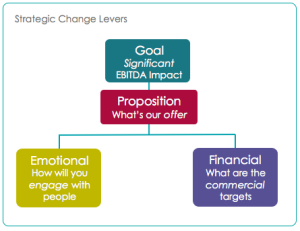If You Don’t Have A Proposition, You Can’t Do Big Things
What’s your proposition?
A simple question, and often one that is met with a blank stare, or a (repeated without much conviction) statement of a few words from the Marketing owned Brand Guidelines – by way of digression, my favourite of all time (and quite possibly therefore wrong) proposition, was the internal one Fuji used to have, which was Kill KODAK… allegedly.
So to me your proposition is the sum of why customers should buy from you, in preference to your competitors. It’s the summit of the loyalty mountain, or the grain of sand around which the pearl is made… you get the picture. And like a lot of things, it’s been in and out of management favour, mostly linked to how strong the Marketing Function is, but partly because it’s hard to define an enduring proposition, and because it’s virtually impossible to keep a business aligned to something that stays the same, in todays ‘shiny new world’ business culture.
We All Need Anchors, Or We Drift Along
So as with most things that can deliver the biggest impact on a business, we spend our time tinkering and tweaking, rather than getting on and doing. Hence why some reading this will already be going “he means mission, not proposition” but here is why I think you should drop anchor at proposition (or mission, or purpose etc).
It’s captures the emotional and commercial reason you exist
And as such it should be the reference point for every decision you make as a business, and provide the spine around which all of your people and business processes are aligned. Put simply, if you can (and you should) state what your proposition is, you will have given yourself the start point for getting BIG things done (or enabling strategic change if you prefer Big Blue Consultancy Terminology).
By BIG, I mean that things that really can make your bottom line shift in double digits. Things like take 30% out of your cost base whilst improving Customer & Colleague Experience. Or reduce absenteeism and sickness because people come to work because it makes them feel better. Or improve your revenue per customer by 20% plus because they spend more and stay longer.
But That’s Not Unique Thinking
I know, great isn’t it! One of the benefits of being in business a while is you get to see the fads, and the enduring trends (I’ll be going all Boston Box next), and a well defined Proposition – together with how it engages emotionally and it’s commercial objectives – belongs to that great enduring trend of “It’s about do the simple things, brilliantly, again and again”
It’s About Harnessing The Change That Happens All The Time
So how does having a clear proposition actually help me? I hear you all saying.
Well lets take the following examples, so you don’t have to take just my word for it:
I have had the opportunity to attend a number of ‘Strategic Marketing Forums’ thanks to my previous ‘blue chip’ client life. One story, told to us as part of a session on why propositions were important (It might help to know this was 25 years ago!) was that the biggest reason why the Railway industry had gone into decline, was because they forgot the were about “Creating Connected Communities” and focused instead on being “railways”. One proposition had limitless possibilities, the other ended in a metaphorical shunting yard.
Then of course we have Steve Jobs & Apple (I do make a clear demarkation between Apple with and without Jobs). All of his working life he was consumed by a defining belief – which is a form of proposition, as I have already indicated it’s not the terminology, it’s the intent and use to which it is put that is important – that Apple existed at the intersection of Art & Engineering. They were there to make things that were beautiful, simple and intuitive to use. And co-incidentally went on to create products and services that re-defined markets and perceptions of what BIG change looks like in a market.
Proposition First – Customers Second
Now most of the time you will hear us go on about the need to be customer centric. So I am going to end with a statement that this is clearly a flawed approach. Because of course you should start with your proposition.
Unless of course you haven’t got a proposition, in which case then you can start with the Customers. Because the other universal truth is that if you don’t create a proposition around which you emotionally engage your colleagues & customers to deliver your financial goals, then your customers and colleagues will create a proposition for your business that almost certainly won’t deliver the return you are looking for.
Oh and just for the record…. Having a clear proposition is the start of being customer centric.

